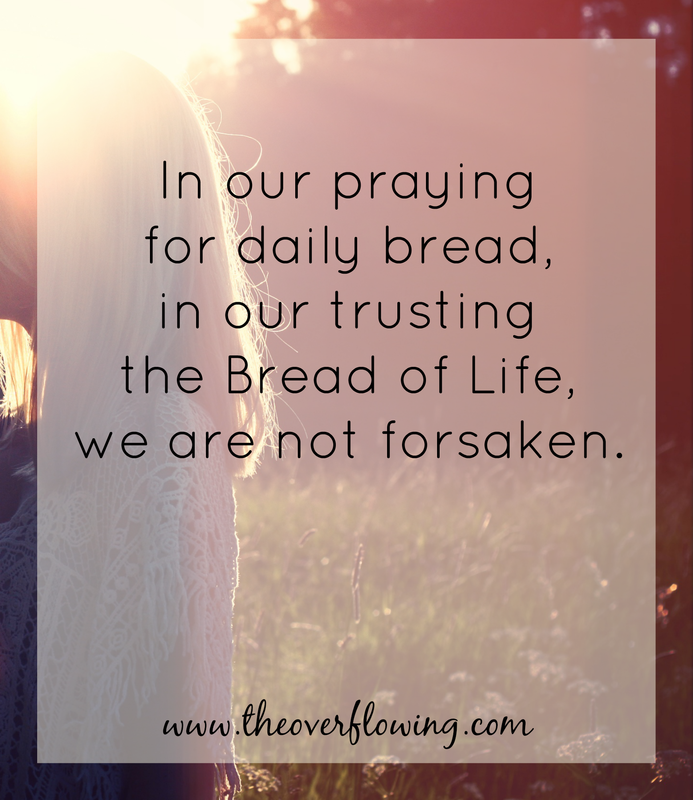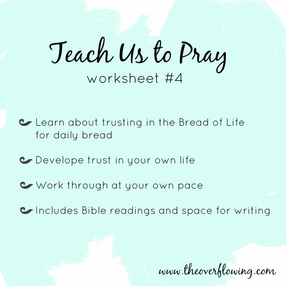|
We’ve been learning about proseuchomai. Prayer that moves toward God and moves forward in God. A communing that goes beyond a tossing up of words, snatches of time here and there when we make a quick request.
Rather, an unceasing fellowship, with all time lived in relationship. Relationship with our Father in heaven. Relationship in His Kingdom, that brings His Kingdom. But we do make requests, for we need the Almighty. And He is our Father who gives good gifts, who responds to the asking. “Our Father in heaven, hallowed be Your Name, Your kingdom come, Your will be done on earth as it is in heaven. Give us today our daily bread. Forgive us our debts, as we also have forgiven our debtors. And lead us not not temptation, but deliver us from the evil one." Matthew 6:9-13, emphasis added. Give us today our daily bread. Yes, we make our requests, but this sentence is much more that. For in this line, there is deep trust. When we pray the Lord’s Prayer, before this asking of God for provision, we recognize who God is as Father and Lord, and commit to His Kingdom, to living in His will. When we do this, when prayer is as much about knowing Jesus more and obeying His will as it is about asking for His help, trust is born. In John 6:35, Jesus declares, “I am the bread of life. Whoever comes to me will never go hungry, and whoever believes in me will never be thirsty.” Give us today our daily bread. Jesus is the Giver of life, the Sustainer of life. This promise is for the physical and the spiritual. He will meet all needs, and He has given us everything we need for a godly life (Philippians 4:19, 2 Peter 1:3). At times, we can compartmentalize our lives. The times we spend in prayer, in reading our Bibles, in going to church, in serving, those are the times we rely on God for provision. But in the daily, in the everyday going to work and cleaning the house and studying for tests and texting with friends and watching our favorite shows, we are rather self-reliant. But what if we prayed for Jesus to be our daily bread? Our Bread for the everyday? So every act was one of trust, of consuming and drinking His life? Give us today our daily bread. A prayer of trust. What gets in the way of my trusting? There are those insecurities. Those feelings of inadequacy. Those fears of failing and of disappointing. Those doubts that ask Does God hear? Will He respond? And these all bar my trusting, they turn my eyes to myself, to my own abilities, and I attempt self-sufficiency. If I just do more… be more… maybe then I can quell the fears. Proverbs 3:5 says, “Trust in the Lord with all your heart and lean not on your own understanding.” In this verse, “trust” comes from the Hebrew batach, which means “to be reliant” and “to hasten for refuge”. This word also speaks of security, confidence and assurance. Choosing to rely on the Lord in spite of insecurities and doubts and fears. Choosing Him as my refuge when insecurities and doubts and fears assail. That is trust. And it brings with it security and confidence and assurance. So how do we trust? How do we pray, “Give us today our daily bread”, not only with our lips, but also with our hearts? Proverbs 3 goes on to say, “In all your ways acknowledge Him, and He shall direct your paths" (vv. 6, NKJV). Trust comes with acknowledging the Lord. To acknowledge God is to recognize His character, to recognize His working and blessing and to express gratitude for who He is and what He has done. Praise and thanksgiving. In all our ways. In all things. Always. This grows trust. Sometimes this giving thanks will be hard. There will be days when the pain and difficulty of life tries to blind the eyes to seeing God. But the more praise and thanksgiving are given, the easier they will be to give. The eyes become stronger, able to see God closeness, even when He seems far. For their is growth. Moving toward and moving forward. And Proverbs 3 continues, “Do not be wise in your own eyes; fear the Lord and shun evil. This will bring health to your body and nourishment to your bones" (vv. 7-8). When I am wise in my own eyes, I am focused on me. On my abilities, on my knowledge. And when my eyes are turned so inward, that is when those insecurities and fears arise. That is when the lies say, God doesn’t listen. God won’t respond. Because I am not acknowledging Him, assurance is elusive. But fear of the Lord, that is the beginning of wisdom, of true wisdom (Proverbs 9:10). And shunning evil so Jesus can be sought with all, that brings health and nourishment. Give us today our daily bread. Jesus, the Bread of Life. In the last post, we talked about a verse from Matthew 6: “But seek first His kingdom and His righteousness, and all these things will be given to you as well” (vv. 33). The but in this verse is there because Jesus was teaching His disciples they should seek God rather than worry about food and clothes. Jesus said those who do not follow God, “run after all these things” (vv. 32). They try to attain material comforts rather than trusting in God and seeking Him. Jesus reminds us that God knows our needs, and as we seek Him, He will provide. Psalm 9:10 says, “Those who know Your Name trust in You, for You, Lord, have never forsaken those who seek You.” Knowing God’s Name, enables us to trust in Him. Knowing His character. Who He is. His love and grace and power and patience and mercy. In the midst of shifting and tilting and rocking and raging, we can trust in the Name of the Unchanging One, the One who is the same yesterday, today and forever (Hebrews 13:8). Because of His firm character, we can rely on God, we can trust in Him. “God is not human, that He should lie, not a human being, that He should change His mind. Does He speak and then not act? Does He promise and not fulfill?” (Numbers 23:19) And in our praying for daily bread, in our trusting the Bread of Life, we are not forsaken. For He surely does act. He surely does fulfill.
The post Teach Us to Pray: Daily Bread first appeared on The Overflowing
Unless otherwise noted, all Scriptures taken from the NIV Hebrew definitions from The New Strong's Expanded Exhaustive Concordance of the Bible by James Strong, copyright 2010 Photo from Unsplash, edited by Jessica Faith
0 Comments
Leave a Reply. |
|





